June 21, 2025 | 03:53 GMT +7
June 21, 2025 | 03:53 GMT +7
Hotline: 0913.378.918
June 21, 2025 | 03:53 GMT +7
Hotline: 0913.378.918
Mr. Cuu's house in Khe Vang area, Phu Do commune (Phu Luong, Thai Nguyen) has more than 1 sample of tea and is currently testing with a new method on 4 sao. From February to June, there was a lot of pest pressure, so he had to use a third layer of defense, neem, that is to spray once every 3-4 days compared to the chemical pesticides , whereas he had to spray once every 7-10 days.
Ms. Do Thi Luyen - an advisor of the Center for Organic Agriculture explained: "Three layers of defense include the first layer of using antagonistic microorganisms such as green fungi to manage pests, antifungal microflora to manage diseases, active defense when pests and diseases are not present. The second layer is to use wood vinegar to repel insects. The third layer is to use herbal medicine like neem when pest density is high.
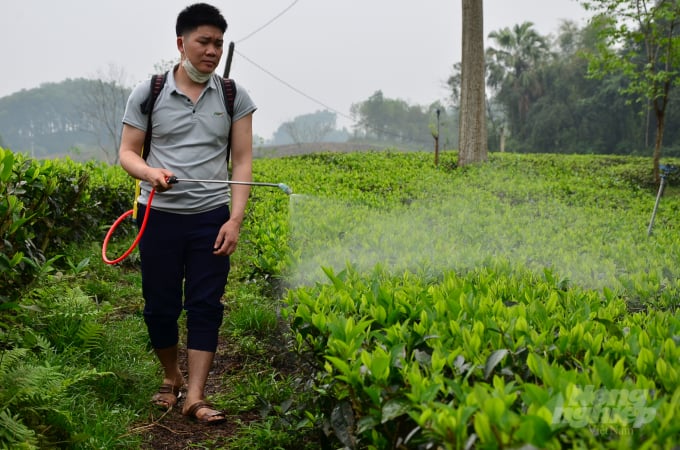
Mr. Cuu spraying herbal medicine for tea plants. Photo: Duong Dinh Tuong.
Neem causes anorexia as well as inhibits the reproduction of worms, so the density will decrease slowly. The weather this year has mainly been cloudy, causing many worms to arise, requiring a lot of spraying, but afterwards, when the garden continuously uses microbiological pesticides and herbs, the balanced ecosystem reduce the frequency of chemicals use... ".
According to Mr. Cuu, in addition to the effort, microbiological and herbal measures, the cost is 1.5-2 times higher, the plant is slower to grow, but he can wear a spray bottle under the sun all day without feeling tired like when he sprayed chemical drugs before. As for the Chairman of Phu Do Commune People's Committee, Mr. Phung Thanh Ha, told me that this mountainous locality has over 700 hectares of tea, in the past, people used chemical pesticides widely, including smuggled Chinese goods:
“The pesticide is very toxic, the isolation period stated on the label is up to 30 days, people wear a spray bottle behind their back with no protection, sometimes spraying their entire heads by mistake. Continuous spraying made 50-60 years old farmers visibly weaker, with dull skin, higher risk of cancer. Going through the tea gardens at that time, the smell of pesticides was strong and that smell followed the farmers home.
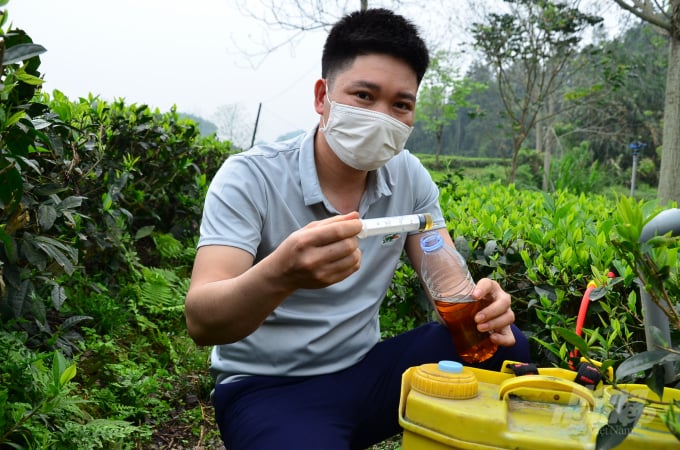
Mr. Cuu mixing herbal pesticides. Photo: Duong Dinh Tuong.
The policy of switching from chemical to biological and herbal pesticides has only been introduced recently, but it is a mandatory step to take. I hope this will be supported on a larger scale because currently the models are small scale. In addition, farmers produce clean, high-quality tea, but the selling price is not commensurate and very precarious so it also partly hinders the application."
Ms. Pham Huong Ha, agricultural extension officer of Phu Luong District Agricultural Service Center faces reality, likes new scientific and technical advances, so when she heard about the neem products, she wanted to bring it to immediate application. “I curiously tasted it and found it a bit acrid, fragrant so I knew it was very safe. Initially, I chose subjects with progressive thinking and stable economy to sample because assuming a loss of productivity or income, they would not be affected much. Currently, these households have not received any support other than technology.
Their motivation is the benefits of clean agricultural products. Producing clean, higher quality tea, but there is still no place to sell stably because the area is small, not concentrated, time for application varies from is nearly a year to only two or three months. Products bought and sold with confidence because the quality has not been tested with each sample costing 3-5 million, farmers can not bear the cost. To replicate this approach, it is necessary to receive support from the State in terms of technology, funding and especially trade advertising, promotion. When there is a good market, people will undoubtedly follow the model, but without a market, people won't listen."
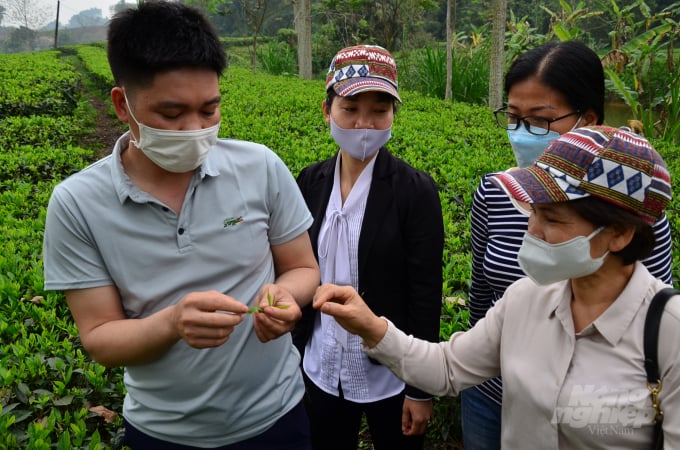
Mr. Cuu asking the technical staff about disease symptoms on tea plants. Photo: Duong Dinh Tuong.
When the model first deployed in early 2021, Ms. Ha investigated around Phu Do, found that in the North there was a large land fund, surrounded by rocky mountains and immediately reported to the leaders of the commune and district to facilitate the formation of a safe production with an area of 10 hectares, a part of which will be dedicated to organic production. Currently, she is allowing households to register for the model. In the future, anyone who participates will be supported with organic fertilizers, herbal pesticides and biology.

Mong people in Phu Tho hamlet harvesting tea. Photo: Duong Dinh Tuong.
According to Ms. Ha, clean production techniques are not difficult, only the output is. To encourage people to apply, other agricultural products besides tea such as rice, vegetables and clean meat are all purchased by her. Hoang Van Tuan - Director of Phu Do Safe Tea Cooperative is a Tay person with a master's degree. When he saw that the environmental problem in agriculture has become a pain, he decided to return to his hometown to improve it and the quality of tea.
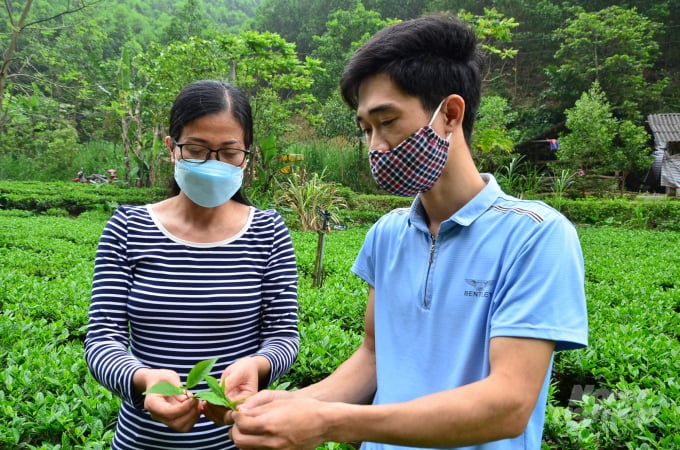
Hoang Van Tuan, Director of Phu Do Safe Tea Cooperative and Ms. Pham Huong Ha, an agricultural extension officer, inspecting tea buds. Photo: Duong Dinh Tuong.
For the past 2 years, he has standardized the production of over 0.7 hectares of tea in his family by stopping all chemicals usage, switching to herbal and biological pesticides while keeping a full record. Thanks to that, the cheapest tea he sold was 200,000 VND/kg and the most expensive was Dinh tea, which was 5 million VND/kg, more than twice as high as farmers spraying chemical pesticides. In addition to planting hybrid tea varieties, he also plans to restore the indigenous midland tea variety that has a strong taste and delicious water but it was abandoned due to low productivity.
The more he went on alone, the more he felt that it was difficult for a small area to build a big brand, so he invited relatives to cooperate. The village cooperative, established earlier this year, covers an area of 2.8 hectares with agricultural orientation combined with cultural tourism. Tuan showed me that in the cooperative's garden, there are not only tea but also vegetables, tubers or elephant grass intercropped which proved to be very safe. The chickens comfortably feed under the tea plants, the children play around while their parents are harvesting tea are testaments to such safety.
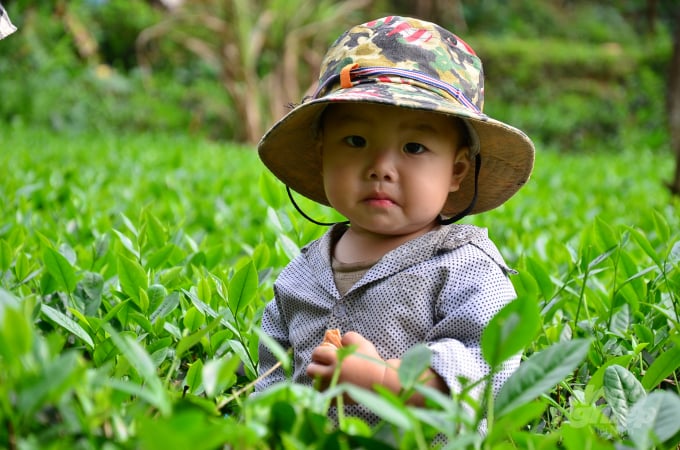
A child following his mother into the tea garden. Photo: Duong Dinh Tuong.
If they continue to produce following the old method, farmers livelihood will increase but not significantly. In order for them to have a higher income, we must lead by example and dare to make clean tea. Only cooperative production is sustainable because the whole community works together.
When I arrived, Ms. Hoang Thi Hang and Nguyen Thi Huong from Goc Gao hamlet, Tuc Tranh commune (Phu Luong district, Thai Nguyen province) were checking newly sprouted tea leaves, they were very thick and plump. They belong to a group of four households that converted from chemical to organic production in early 2021 with an average area of about 4,000-5,000 square meters per household.
“I switched to organic, firstly for the health of my family because there is no exposure to harmful chemicals, products for home use and for the market are practically the same.
Currently, we are using three layers of protection for tea plants, the first layer uses anti-fungal microorganisms green fungi, the second layer uses garlic and chili to repel insects, the third layer uses neem to kill insects when the density is high. In addition, we also self-fertilize using Emuniv to incubate soybeans, fish or send preparations to nearby chicken farmers to sprinkle on the floor of the coop and then buy them. The owner of the farm can sell manure and also benefit from the lack of smell, the chickens have less respiratory diseases and no mites…”
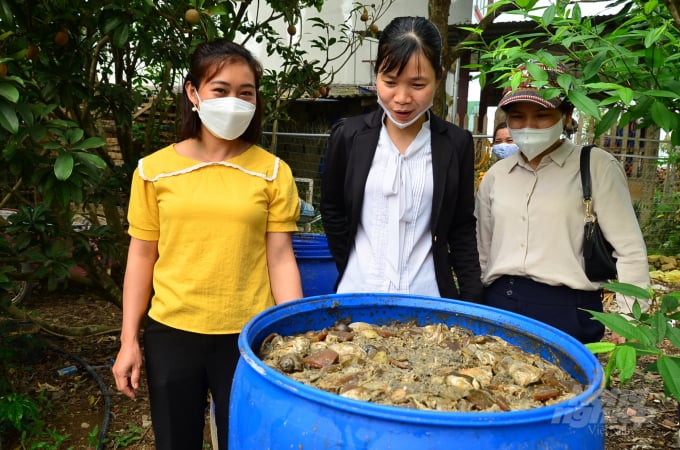
Ms. Hang (on the left) and a technician checking the fish compost bin. Photo: Duong Dinh Tuong.
According to Ms. Hang, at first, when the direction was changed, output of the first and second batches decreased by more than half. The couple returned from a visit to the garden and found the tea extremely bad. Hearing this, Master Nguyen Thi Yen, an officer of the Center for Organic Agriculture, explained: "Due to current chemical fertilizers, chemical pesticides and stimulants use, she did not make the switch but cut 100% chemicals suddenly, plus the soil has never been fertilized with organic fertilizers before, so the tea plants were shocked. In the first year, she should only reduce the chemical by 70% to let the plants gradually adapt.”
The yield of organic tea can't be on par with the chemical one, but the environment has changed completely. Soil that used to be hard is now more porous, there were no natural enemies or beneficial insects such as locusts, ants, bees, spiders, worms... before and now there are quite a few. The group's products are fully purchased by a focal point, although the price was not as high as expected, but it also started to have merit.
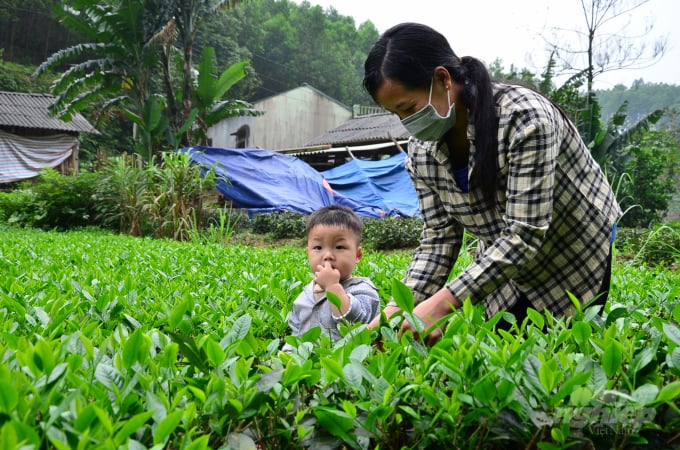
Following mother to the garden. Photo: Duong Dinh Tuong.
“Onlookers see that we are working hard, they are afraid to follow, but we are determined that new things are always more difficult than favorable, so we just encourage each other that the profit from agricultural production using chemicals may not be enough for diseases treatment. In the second year, we hope to produce tea more leisurely, with higher productivity and especially the price will hopefully commensurate with the quality.” Ms. Hang shared.
Translated by Nguyen Hai Long
![Turning wind and rain into action: [9] Digitizing hydrometeorological data in response to climate change](https://t.ex-cdn.com/nongnghiepmoitruong.vn/608w/files/news/2025/06/17/z6704423696987_15fd32ffc26d590d204d520c9dac6786-nongnghiep-165943.jpg)
(VAN) Farmers have begun accessing hydrometeorological applications to adjust their cropping schedules, aiming to ensure productivity and adapt to climate change.
![Turning wind and rain into action: [8] Real-time salinity detection and early warning technology](https://t.ex-cdn.com/nongnghiepmoitruong.vn/608w/files/news/2025/06/17/z6704423696987_15fd32ffc26d590d204d520c9dac6786-nongnghiep-151127.jpg)
(VAN) Thanks to the integration of modern hydrological-hydraulic models, remote sensing technologies, and artificial intelligence, the accuracy of hydrological forecasting has significantly improved.
![Turning wind and rain into action: [7] Early disaster warnings help marine farmers minimize losses](https://t.ex-cdn.com/nongnghiepmoitruong.vn/608w/files/news/2025/06/17/z6704423696987_15fd32ffc26d590d204d520c9dac6786-nongnghiep-142942.jpg)
(VAN) In recent years, thanks to early disaster warnings and forecasting, marine farmers in Khanh Hoa province have been able to reduce risks and losses, thereby improving production efficiency.
![Turning wind and rain into action: [6] ‘Four on-the-spot’ disaster management software](https://t.ex-cdn.com/nongnghiepmoitruong.vn/608w/files/news/2025/06/17/e5a48259d6a262fc3bb3-nongnghiep-183800.jpg)
(VAN) By simply activating the scenario on the disaster management software, the relevant authorities immediately know how many households need to be evacuated, where to evacuate them to, and by what means of transportation…
![Turning wind and rain into action: [5] Hue applies modern technology in disaster forecasting](https://t.ex-cdn.com/nongnghiepmoitruong.vn/608w/files/news/2025/06/17/z6704423696987_15fd32ffc26d590d204d520c9dac6786-nongnghiep-093938.jpg)
(VAN) In Hue city, modern technology has recently been applied in meteorological and hydrological forecasting and warning, helping to reduce the damage caused by natural disasters.

(VAN) A cutting-edge farming technique being implemented on an experimental ranch in Arizona's Sonoran Desert has already saved a billion gallons of water over five years, according to Civil Eats.

(VAN) Poultry and pig production and the environment can be boosted through enhanced water technology, according to new research.